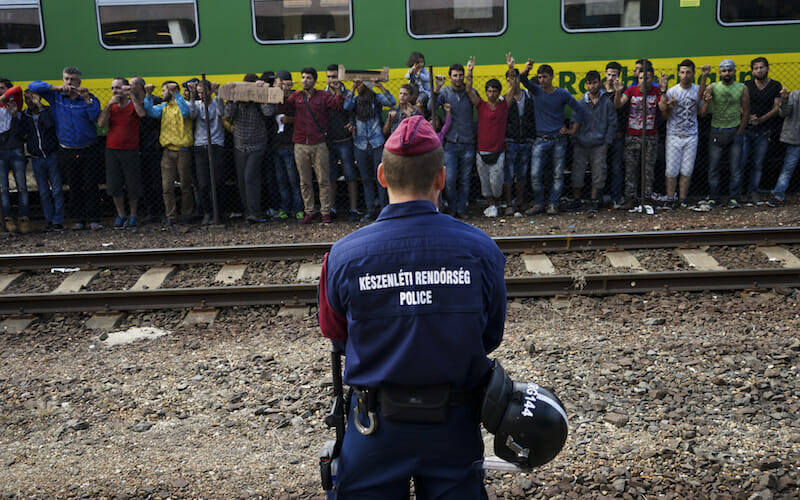
Making up for What we’ve Caused: Viewing Migration into Europe as Reparations for Colonization
In a visceral depiction of the extreme European current attitude toward refugees. Far right Greek protesters yelled “burn them alive” toward a group of migrants and refugees demonstrating on April 22 in Lesbos. Austria’s Chancellor Sebastian Kurz plans to take an even harder stance on refugees entering Europe than that currently undertaken by the EU when he assumes the chairmanship of the Council of Europe in two weeks. Given this violent rhetoric and climate, it is clear that Europe has lost sight of the long-term historical context for migration from Africa and the Middle East to Europe.
At least 62 million Europeans migrated to the continent from the south between the 19th century and mid-20th centuries. Europeans extracted resources from the land and killed or displaced human beings for their benefit, establishing a global co-dependence that persists today. Entire regions were destabilized in European colonialists’ national borderline drawing projects of Middle Eastern territories soon lost to independence to maintain the UK and France’s spheres of influence; 23 million people, a majority of whom were Syrians, Iraqis, and Yemeni, are currently internally or intra-regionally displaced. The global co-dependence and regional instabilities stemming from European involvement are in large part what has led to the present refugee crisis.
Today, 171,635 non-European citizens reached Europe by boat in 2017 (less than half as many as in 2016); most aren’t doing so for economic profit but because they flee persecution, war, and crippling poverty that is a real threat to countless families’ lives. Movements south to north and east to west can be seen as a rebalancing of resource extraction and prosperity-seeking from Europeans to former colonies and otherwise invaded land.
Given the centuries of extraction and exploitation, and the role Europe has intentionally and complacently had on the continent of Africa and the region we call the Middle East, is it not time that we consider migration into Europe as (neo) colonial reparations?
Opening migration as a form of reparations would constitute a fundamental reframing of widespread European stances on immigration, refugee integration, and decolonization to one that fits within the Transitional Justice (TJ) framework. TJ is a method for countries or regions, overcoming years of conflict and harm, to do so with accountability and redress for victims of violence, and the children of victims.
Reparations are a public acknowledgement of the legal obligation of a state, individual(s), or a group to repair the consequences of human rights and international law violations they have committed directly or failed to prevent.
Reparations within Transitional Justice are not only monetary, but relate to emotional and physical wellbeing, provision of land and social support, and a fundamental attempt to redress previous harm and trauma stemming from concessions made by both sides — Europe and the Global South (Africa and the Middle East).
We must never forget the not so trivial connection between European and North American colonization and subsequent prosperity and the instability, poverty, and hardship in the vast majority of migrants’ countries of origin. Thus, immigration from countries like Iraq, Eritrea, Syria, and Somalia should all be understood through the same lens of colonial violence that requires reparation.
This necessitates an expansion of the classification of what constitutes an economic migrant versus a refugee, with inclusion of the lasting impact of European colonization and resource extraction within or in addition to these boundaries. The 1967 expansion of the UN Status of Refugees, initially drafted in 1948, to include all victims of persecution and violence that occurred after and before World War II allows for this.
This argument is not intended to uphold European or Western exceptionalism in quality of life and economic opportunity, nor notions that Europe is ‘better’ than Africa and the Middle East. Quite the opposite. EU member states’ citizens,’ and journalists’ inhumane treatment of refugees at its internal and external borders proves that Europe is not a land of equality and opportunity for all.
Nor is this sufficient recompense for centuries of violence, destruction, and lasting harm; but it is a step in the right direction.
It also doesn’t mean that there should not be immigration processes. This is not feasible politically nor for the sake of Europe’s sovereignty and security. I am calling for an expansion of migration policies to include three categories of migrant: refugee, economic migrant, and reparation recipient. Such a change would ensure that the connection between European colonialism and the current waves of migration are recognized and taken into account.
European citizens and politicians should begin to think less about migrants and refugees as people escaping only short-term instability that could become improved with peace accords in a couple years. We should think about migration onto the Old Continent as a continued project of transition and reparation for the hundreds of years of harm that our direct ancestors knowingly inflicted on countries to the South and East of us.
